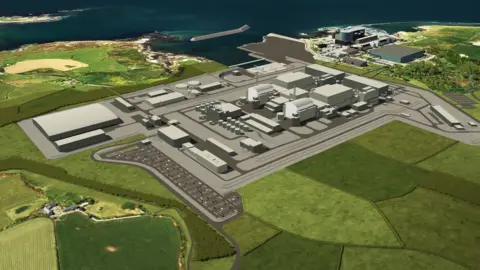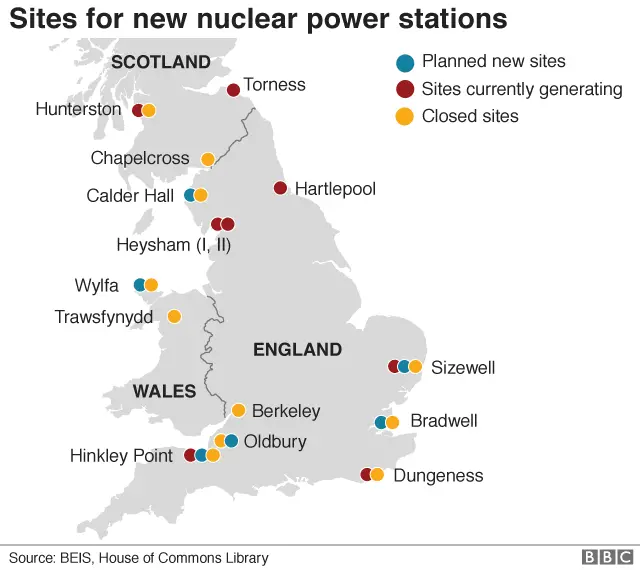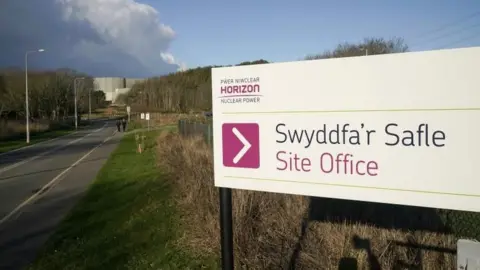Nuclear plant in Anglesey suspended by Hitachi
 Horizon Nuclear
Horizon NuclearHitachi has said it will suspend work on a multi-billion-pound UK nuclear project because of rising costs.
The decision puts thousands of jobs at risk if the £13bn plant at Wylfa Newydd in Anglesey, north Wales, is scrapped.
The Japanese firm had been in talks with the UK government since June about funding for the project, which was being built by its Horizon subsidiary.
The government said it had failed to agree terms with Hitachi. The nuclear industry said it was "disappointing".
Hitachi said it would also suspend work on another site, in Oldbury in Gloucestershire, "until a solution can be found".
About 9,000 workers had been expected to be involved in building the two nuclear reactors, which were due to be operational by the mid-2020s.
Hitachi said the decision would cost it an estimated 300bn yen (£2.1bn) as "extraordinary losses".
It said it was suspending the project "from the viewpoint of its economic rationality as a private enterprise".


Hinkley, Moorside, Wylfa, Oldbury, Bradwell and Sizewell were identified as the sites for the most significant national wave of new nuclear power construction anywhere in the world.
Of those six - only one is under construction, three have been abandoned and two face an uphill battle to get the green light.
Under those circumstances you might think the government would be embarrassed that its energy policy was in disarray. But it's not.
The collapse of the Wylfa and Oldbury projects today (following the abandonment of Moorside) is evidence of some new economic realities that have seen government enthusiasm for new nuclear fade.
The first and most obvious is the cost of building the darn things.

The Nuclear Industry Association says the UK has six sites that are licensed to build new nuclear power stations and eight sites that are currently generating power.
However, it said that only one of the eight currently operating are due to be in use by 2030.
The GMB union warned of an energy crisis.

Policy questions
Duncan Hawthorne, chief executive of Hitachi's Horizon subsidiary, said the Anglesey site remained "the best site for nuclear development in the UK" and that the company would "keep the option to resume development in future".
The new nuclear plant had been intended to have a generating capacity of 2,900 MW and have a 60-year operational life.
The decision puts the UK's nuclear policy under fresh scrutiny.
In November, plans to build a nuclear power station at Moorside in Cumbria were halted after Toshiba announced it was winding up its NuGeneration subsidiary, which was behind the project.
A spokesperson for the Department for Business, Energy & Industrial Strategy (BEIS) said: "As the Business Secretary [Greg Clark] set out in June, any deal needs to represent value for money and be the right one for UK consumers and taxpayers.
"Despite extensive negotiations and hard work by all sides, the government and Hitachi are unable to reach agreement to proceed at this stage."
 Getty Images
Getty ImagesThe department added that the land was owned by Hitachi, which had indicated it wished to retain ownership while it discussed future options with the government.
Shadow business secretary Rebecca Long Bailey said the government's nuclear strategy was now "lying in tatters" and had "escalated into a full-blown crisis".
The news was greeted with dismay by the Nuclear Industry Association.
Tom Greatrex, chief executive of the association, said it was "disappointing, not just for the Wylfa Newydd project but for Anglesey and the nuclear industry as a whole".
"The urgent need for further new nuclear capacity in the UK should not be underestimated, with all but one of the UK's nuclear power plants due to come offline by 2030."

The UK nuclear industry
- Successive governments have supported nuclear as a low-carbon way of generating electricity
- The UK has 15 nuclear reactors, generating about 21% of its electricity
- Britain's newest nuclear power station is Sizewell B, which started generating in 1995
- Sizewell B's expected shutdown date is in 2035
- ONS said in 2014 that there were 15,500 people employed in the civil nuclear industry.
Source: House of Commons Library except when other source given and BBC Reality Check

'Significant blow'
Justin Bowden, the GMB union's national secretary for energy, said the decision raised "the very real prospect of a UK energy crisis".
"While the government has had its head up its proverbial backside over Brexit, vital matters like guaranteeing the country's future energy supply appear to have gone by the wayside."
The CBI described the news as a "significant blow to the UK's future energy supply plans".
Matthew Fell, the CBI's chief UK policy director, said: "The government has to demonstrate it is committed to meeting our climate change targets by supporting new low-carbon power supply.
"The loss of new nuclear projects could leave us more heavily dependent in the long run on fossil fuels, which could risk our legally binding climate targets."
The government says it has a range of options for meeting future energy demand, including renewables, storage, interconnectors, new nuclear and more.
If the Wylfa Newydd project is scrapped, it leaves the Hinkley Point power station in Somerset as the only new UK reactor still being built.
There are plans for new plants at Bradwell and Sizewell, but neither is currently under construction.
The British and Japanese prime ministers met earlier this month and Theresa May said she had raised the issue with her counterpart.